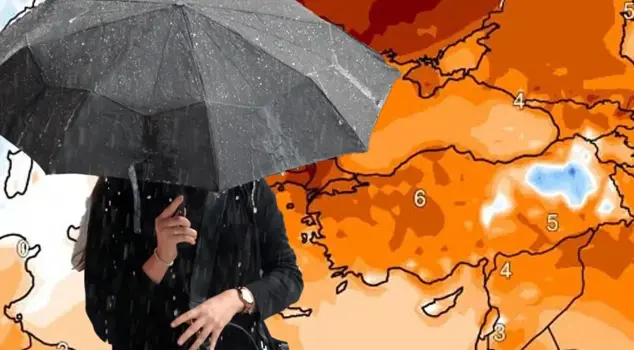
04.01.2025 11:20
It is predicted that Turkey will be under the influence of Siberian high pressure for the next 10 days, except for the western Aegean and the western and central Black Sea coasts. Experts have stated that due to the strong high-pressure conditions, Turkey is expected to enter a generally dry period, with the exception of the rainfall anticipated in the western half of the country during the first few days.
The impacts of the climate crisis continue to affect countries. Recently, experts warned that Turkey is entering a dry period again.
"RAINS STARTED LATE"
Prof. Dr. Murat Türkeş, a member of the Board of Directors of the Boğaziçi University Climate Change and Policy Application and Research Center, stated that global climate change is causing a shift in the balance of air temperatures and surface water temperatures. Expressing that rains have started late in many regions of Turkey and in Izmir, Prof. Dr. Murat Türkeş said, "The impact of drought in Izmir has decreased with the rains in October and November, but the effects of long-term drought continue. We understand this especially from the low water levels of dams, ponds, rivers, and streams, the decrease in soil moisture, and the condition of vegetation and agricultural products."
"WE WILL ENTER A DRY PERIOD AGAIN"
Prof. Dr. Türkeş stated that Turkey has transitioned from rainy weather systems to high-pressure conditions shortly before the new year. "We were happy about the rains, but Turkey will be under the influence of Siberian high pressure for the next 10 days, except for the first few days in Western Anatolia, the Western and Central Black Sea coasts. Due to the strong high-pressure conditions, we will generally enter a dry period again, except for the expected rains in approximately the western half of Turkey in the first few days. Air temperatures are expected to be warmer than normal in almost all of Turkey, except for Northeastern Anatolia, for at least 10 days," he said.
"SEA SURFACE TEMPERATURES DO NOT DROP SUDDENLY IN COLD WEATHER"
Reminding that autumn has been warmer and drier than normal in a large part of Turkey, Türkeş stated that the increase in air temperatures is also reflected in sea surface water temperatures, saying, "The average sea surface temperatures in the Black Sea and Marmara coasts are 20-23 degrees Celsius, in the Aegean coasts 22-24 degrees Celsius, and in the Mediterranean 24-27 degrees Celsius. However, this autumn, sea surface temperatures were 1-2 degrees Celsius warmer than normal in the Mediterranean basin and on the Turkish coasts. In the Central and Eastern Black Sea, they were 2-3 degrees Celsius warmer than normal. The situation of being warmer than normal in sea surface temperatures on the Turkish coasts seems likely to continue in January as well. Because sea surface temperatures do not drop suddenly when the air cools. I can say that in January, we will face sea surface temperatures that are 1-3 degrees Celsius higher than normal on the Turkish coasts," he said.
"IT AFFECTS THE ECOSYSTEM NEGATIVELY"
Pointing out that the higher than normal sea surface temperatures and the prolonged duration of this situation negatively affect the ecosystems and biodiversity in the seas, Prof. Dr. Türkeş stated, "The fact that Turkey's seas are warmer than normal explains the increase of invasive foreign species in the Mediterranean, Aegean, and Marmara. One of the reasons for the intense mucilage we experienced in the past was pollution, but we also saw that it corresponded to a period when the sea water was much warmer than normal. Pollution and warmer sea water than normal can lead to ecosystem problems in the sea," he said.